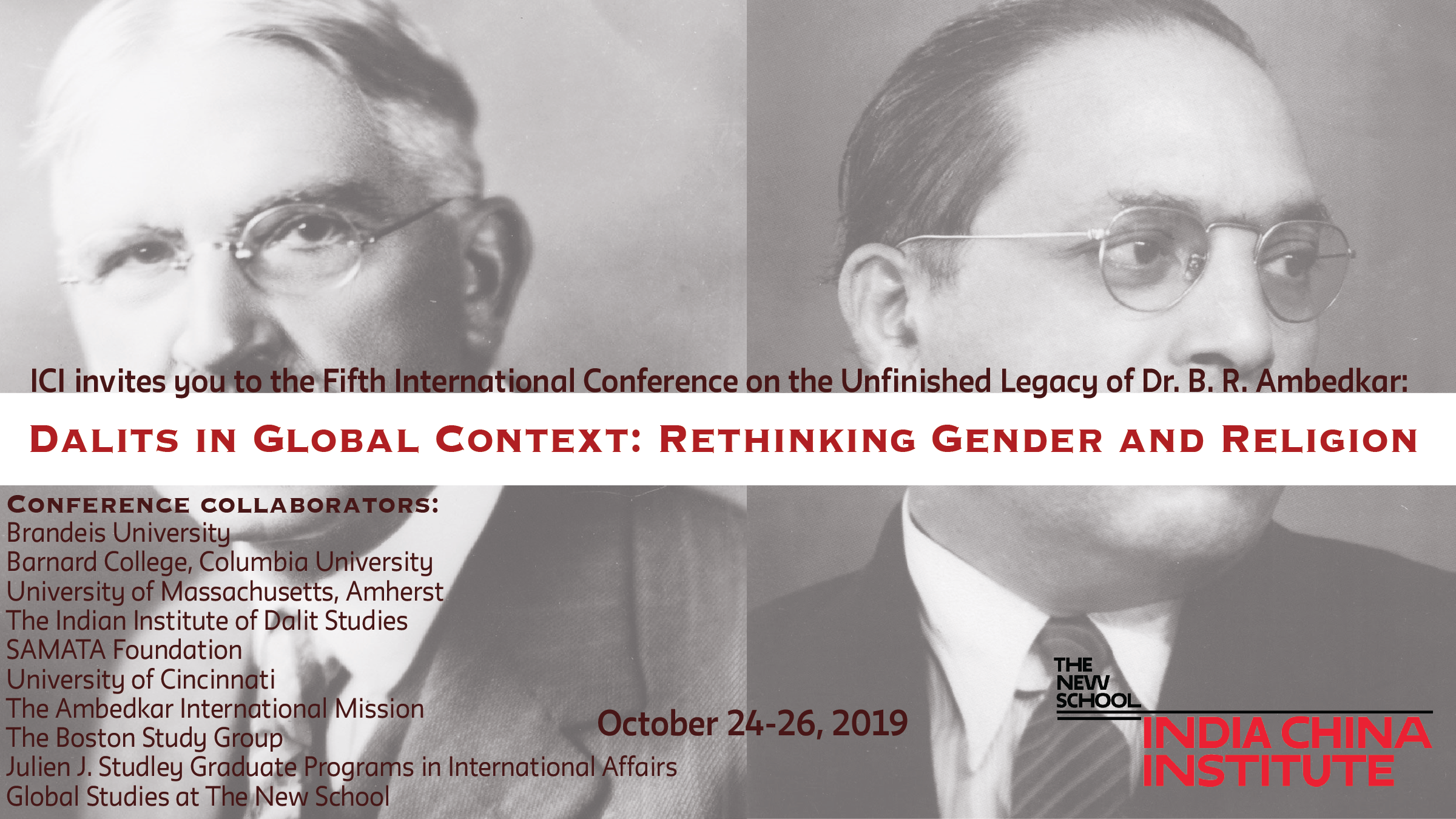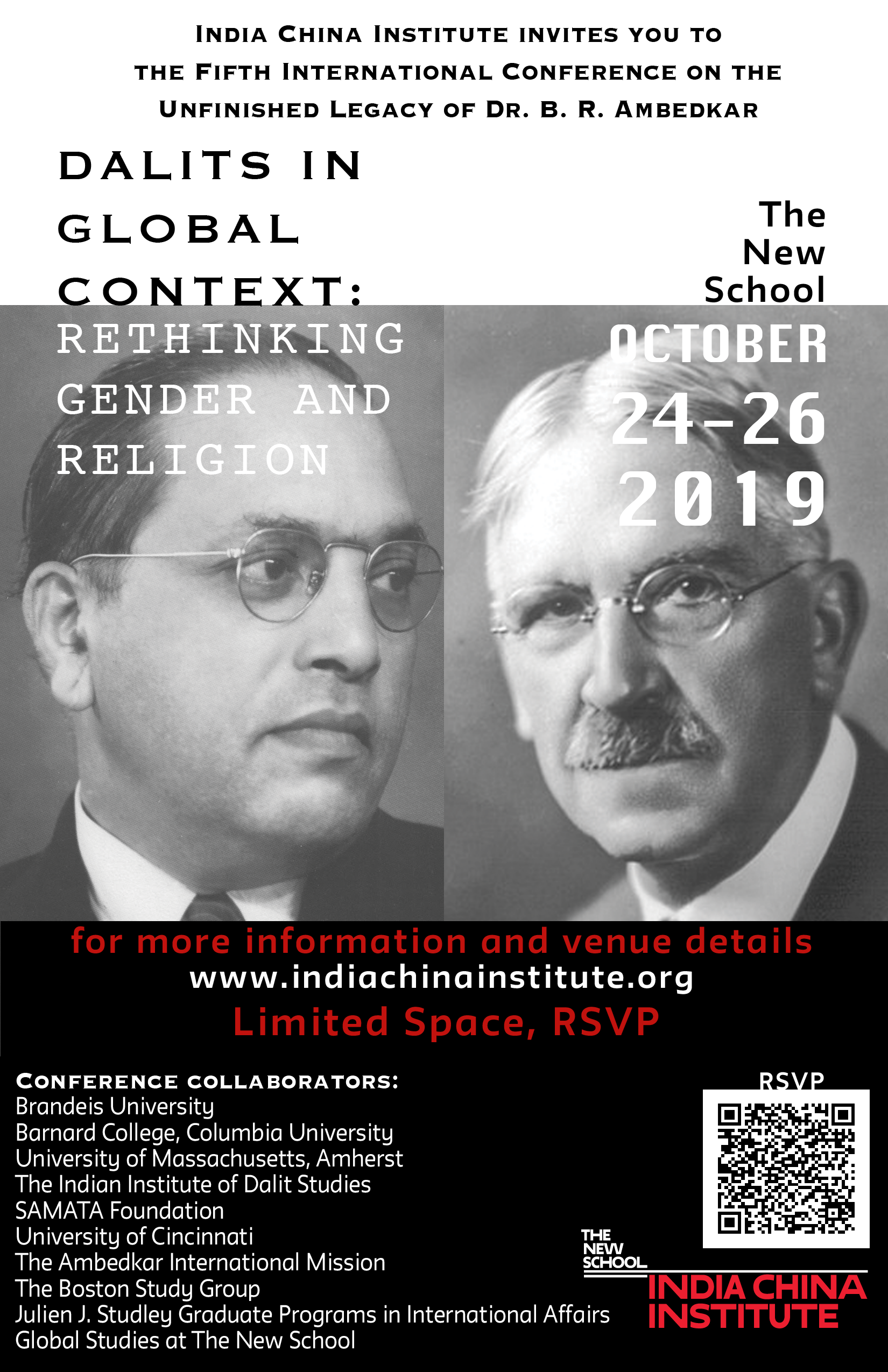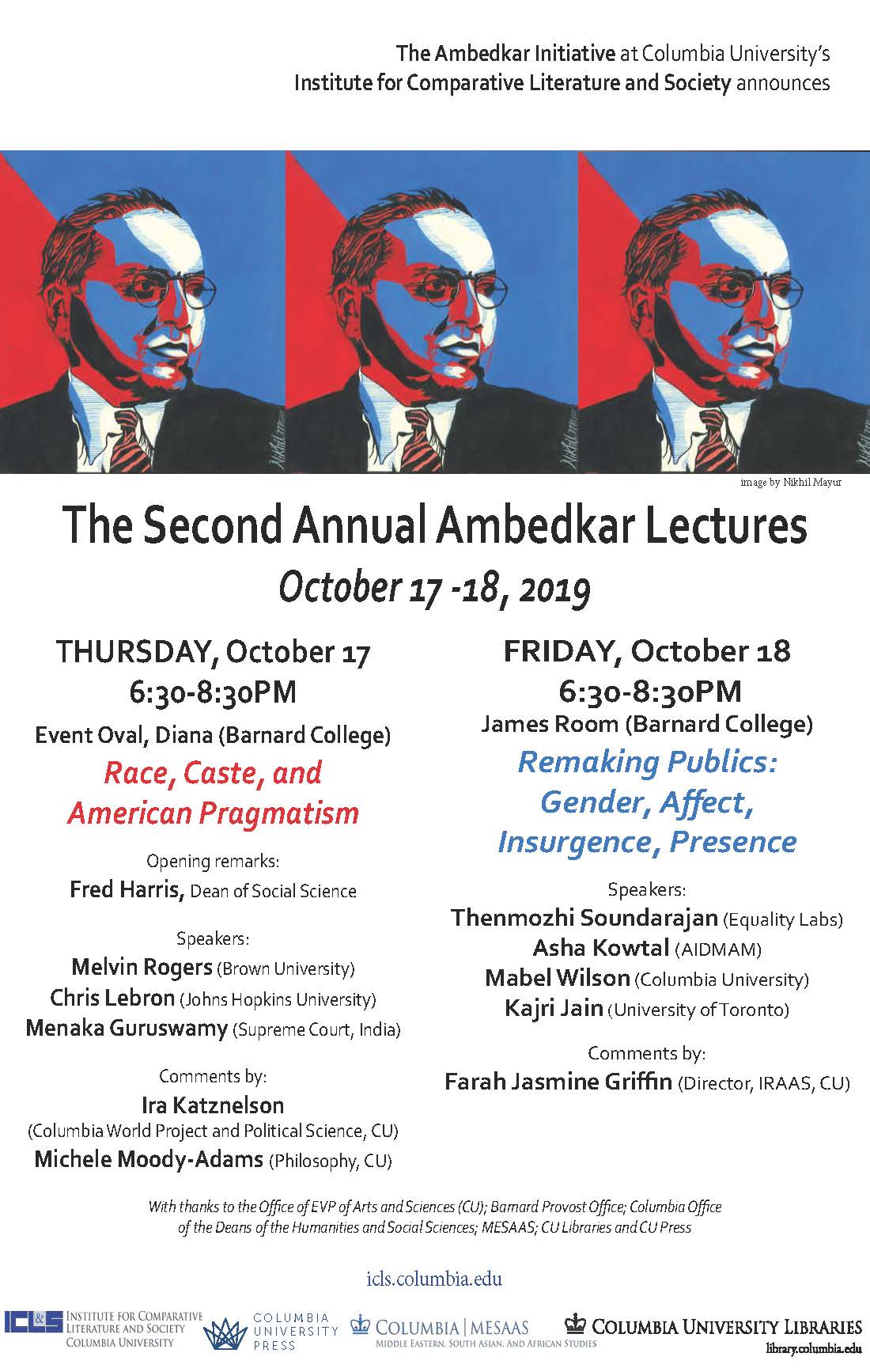
Fifth International Conference on the Unfinished Legacy of Dr. B. R. Ambedkar – Dalits in Global Context: Rethinking Gender and Religion
October 24, 2019 – October 26, 2019

RSVP for The Fifth International Conference on Unfinished Legacy of Dr. Ambedkar

From October 24-26, 2019, the New School will host the Fifth International Conference on the Legacy of Dr. B.R. Ambedkar. This year’s conference theme is Dalits in Global Context: Rethinking Gender and Religion.
Ambedkar Conference Agenda Final
5th International Ambedkar Conference Bios
The conference will explore critical issues faced by the Dalit community, with a focus on the intersecting nature of gender, religion, and caste-based discrimination. Since its inception, the Ambedkar Conference has convened various scholars and practitioners, institutions and organizations across the world, creating a space to discuss the politics of equal dignity and equal rights for Dalits. This year, we hope to further this conversation.
While the New School is this year’s host, the conference is a collaboration between the following universities and think tanks:
- Brandeis University
- Barnard College, Columbia University
- University of Massachusetts, Amherst
- The Indian Institute of Dalit Studies, India
- SAMATA Foundation, Nepal
- University of Cincinnati
- CASTE: a Global Journal on Social Exclusion
- International Ambedkar Mission, USA
- Boston Study Group
- India China Institute, The New School
- Julien Studley Graduate Study Program in International Affairs
- The Global Studies Program, The New School
Related Event:
Second Annual Ambedkar Lectures at Columbia University, organized by Anupama Rao
Oct. 17th: Race, Caste, and American Pragmatism
Oct. 18th: Remaking Publics: Gender, Affect, Insurgence, Presence

Other Related Events:
Workshop (invite-only) on Dalits in Global Context: Rethinking Religion and Gender Sponsored by The Henry Luce Foundation
From October 21-24, 2019, the India China Institute at The New School is hosting a focused workshop along the theme of the conference. The primary goal of the workshop is to convene an invited group of Global Dalit Change-makers — young and emerging scholars from within and outside of the Dalit community who are already working at the junction of gender, religion, caste, and social justice. ICI will also invite established scholars and practitioners in the field to help inspire the workshop with intellectual rigor, deep critical inquiry, and innovative practices.
This will be a new kind of conversation— the first workshop of its kind outside of South Asia, one that combines scholarship and activism, and strengthens conversations between scholars and practitioners when analyzing caste-based discrimination. The selected group of workshop participants will then join the Ambedkar Conference at the New School, where they will present their work.
100 Years of New
2019 marks The New School’s centennial year, and thus provides an opportunity to reflect not only on the university’s history of critical social inquiry, but also the early days of the school’s founding. B.R. Ambedkar, while a student at Columbia University, studied under one of The New School’s co-founders, John Dewey, and was greatly influenced by him. The Ambedkar Conference is an opportunity for the New School to convene individuals who are writing and researching in the New School’s spirit of creative and critical scholarship, and who, more than anything, are training their gazes on a future we’ll soon inhabit.
The Bluestone Rising Scholars Prize
Brandeis University, original convener of the International Conference on the Unfinished Legacy of Dr. B.R. Ambedkar, awarded inaugural Bluestone Rising Scholar Prizes to two early career scholars, to be published in CASTE: A Global Journal on Social Exclusion. The prize recipients will take part in an Award Ceremony at Brandeis University, and then join the International Conference at The New School.
More Conference Information:
Information for Call for Papers
I am born a Hindu, but I will not die a Hindu, for that is in my power.
B. R. Ambedkar, Yeola Conference, Maharashtra, India, 193
The most problematic aspect of Hindutva is the issue of the treatment of lower castes and tribes. It’s not only that you can ignore some people, but that you identify who it is that you can ignore.
Amartya Sen, Harvard University Interview in The Hindu, Feb. 28, 2019
According to the International Dalit Solidarity Network, “caste discrimination is one of the biggest human rights violations facing the international community today; both in terms of the numbers affected and the severity of the human rights violations caused by this form of discrimination.” The caste system is one of the most brutal forms of hierarchical social organization and caste-based discrimination affects over 250 million people in South Asia and across the globe. Dalits, that is, the “former Untouchables” are on the lowest rung of the Hindu social structure and South Asian society. Despite some increased legal protections in caste-affected countries within and without South Asia, the Dalit community continues to face indignities ranging from daily humiliations, to extreme poverty and servitude, to violence and murder. These indignities are still largely shaped by understandings and practices of religion and underlying notions of purity and impurity as determined by birth and exacerbated by gender relations. For the Dalit community, the entrenched caste system sanctions a massive denial of citizenship and fundamental rights which others enjoy under the constitutions of countries in South Asia.
During this conference, we aim to address issues or questions related to the theme of religion, caste, gender and social justice in or comparative to the South Asian context. These questions might include some of the following:
How can we rethink and reimagine established and emerging debates concerning these issues on methodologies, research, policies, and trans-boundary collaborations?
How have the hierarchies of gender and sexuality affected and been transformed by Dalit women and men?
What are the personal and political actions that Dalit women and men have taken to negotiate with patriarchy, both inside and outside the Dalit community?
How do we engage with Dalit women’s lives at the intersections of gender, caste, class, and religion?
How have Dalits used practice and faith to claim dignity and build solidarity? How have they expressed their experiences and aspirations in literary and other art forms to resist injustice and inhumanity?
In what ways have Dalit women (and men) carved out a new transnational political space to imagine a brighter future?
How can we analyze the intersections of caste and religion beyond Hinduism, for example in Islam, Christianity, Buddhism or Sikhism, specifically in South Asia?
For more information about Dalit issues, please visit:
International Dalit Solidarity Network
Indian Institute of Dalit Studies
